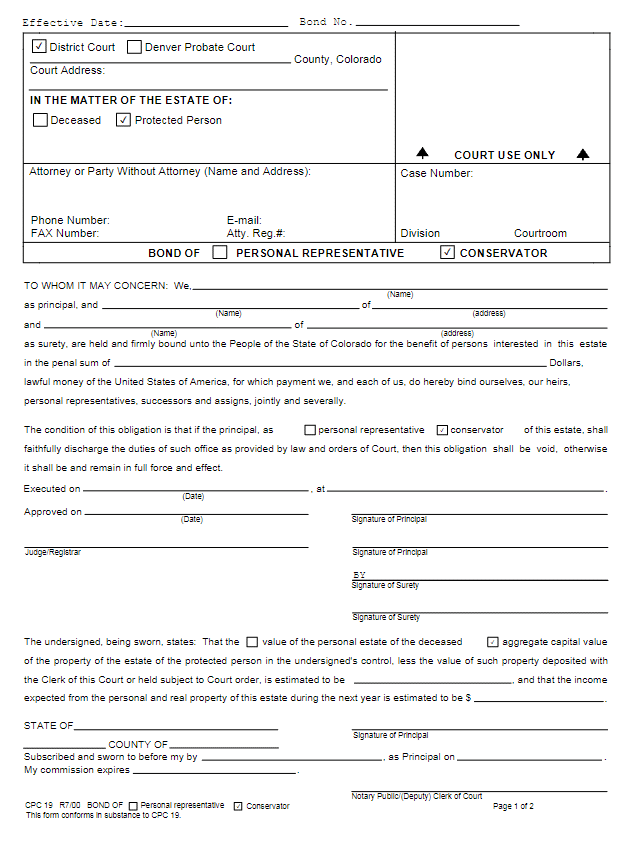Colorado Conservator Bond: A Comprehensive Guide
This guide provides information for insurance agents to help their customers obtain a Colorado Conservator bond.
At a Glance:
- Average Cost: Calculated based on a tiered structure
- Bond Amount: Determined on a case-by-case basis (more on this later)
- Who Needs It: Most conservators appointed as fiduciaries in Colorado
- Purpose: To ensure the protected person receives compensation for financial harm if the conservator mishandles their estate
- Who Regulates Conservator Bonds in Colorado: The district court of the county where the protected person resides or has property

Background
Colorado Code 15-14-401 requires all persons seeking conservatorship over a protected person’s estate to be appointed by a court before assuming their fiduciary duties. The Colorado legislature enacted the appointment requirement to ensure that conservators act in the protected person’s best interests when managing their estate. To provide financial security for the enforcement of this requirement, most conservators must purchase and maintain a probate surety bond before becoming appointed as a fiduciary.
Outside of cases handled in Denver, all conservatorship cases are under the jurisdiction of the district court of the county where the protected person resides or owns property. If the protected person resides or owns property in Denver, the conservatorship must be handled in the Denver Probate Court.
What is the Purpose of the Colorado Conservator Bond?
Colorado requires most conservators to purchase a surety bond as a prerequisite to being appointed as a fiduciary over a protected person’s estate. The bond ensures that the protected person will receive compensation for financial harm if the conservator fails to abide by the regulations outlined in Colorado Code 15-14-415. Specifically, the bond protects the protected person if the conservator fails to adhere to all court orders or mismanages the estate’s assets. In short, the bond is a type of insurance in favor of the protected person if the conservator does not fulfill their fiduciary duties.
How Can an Insurance Agent Obtain a Colorado Conservator Bond?
BondExchange makes obtaining a Colorado Conservator bond easy. Simply log-in to your account and use our keyword search to find the “Conservator” bond in our database. Don’t have a login? Gain access now and let us help you satisfy your customers’ needs. Our friendly underwriting staff is available by phone (800) 438-1162, email or chat from 7:30 AM to 7:00 PM EST to assist you.
At BondExchange, our 40 years of experience, leading technology, and access to markets ensures that we have the knowledge and resources to provide your clients with fast and friendly service whether obtaining quotes or issuing bonds.
Not an agent? Then let us pair you with one!

Click the above image to find a BX Agent near you
How is the Bond Amount Determined?
Colorado Code 15-14-415 dictates that the bond amount must equal the aggregate value of the estate’s property under the conservator’s control plus the estimated income to be generated by the estate over the next year.
The bond amount may be reduced by the value of any assets deposited that cannot be withdrawn without a court order or any land that the conservator can not sell without authorization from the court. Fiduciaries that do not wish to purchase a bond may request to submit a form of collateral instead, such as a pledge of securities or a mortgage of land.
Can the Bond Amount be Adjusted?
Yes, as Colorado Code 15-14-416 allows conservators to request a reduction in the required bond amount. However, conservators that request a reduction will be required to provide the court with information such as a credit report, financial statements, and other documents in support of their request.
What are the Underwriting Requirements for the Colorado Conservator Bond?
Most surety companies will examine the following factors when determining eligibility for the Colorado Conservator bond:
- Conservator’s credit history
- Whether or not the estate has an attorney
- Whether or not the conservator is a family member
- The conservator’s occupation
- Whether or not the conservator is replacing a prior fiduciary
- If the conservator has ever committed a felony
- Whether or not there is any ongoing business in the estate
- If a creditor is requiring the bond
- If the bond amount is greater than or equal to the estate’s value
How Much Does the Colorado Conservator Bond Cost?
Surety companies typically determine the premium rate for Conservator bonds based on a tiered structure, so larger bond amounts will be charged a lower premium rate than smaller bonds. Additionally, Colorado Code 15-14-416 allows for the protected person’s estate to pay for the cost of the bond unless otherwise directed by the court.
The following table illustrates the pricing structure for the Colorado Conservator bond:
$1,500,000 Conservator Bond Cost
| Bond Amount | Premium Rate | Total Bond Cost |
|---|---|---|
| First $20,000 | 0.75% | $150 |
| Next $40,000 | 0.60% | $240 |
| Next $140,000 | 0.50% | $700 |
| Next $300,000 | 0.375% | $1,125 |
| Next $1,000,000 | 0.25% | $2,500 |
| Total cost of $4,715 |
Who is Required to Purchase the Bond?
Colorado requires most conservators to purchase a surety bond as a prerequisite to becoming a court-appointed fiduciary. To paraphrase Colorado Code 15-14-102, a conservator is a person that is at least 21 years old and who is appointed as a fiduciary to manage a protected person’s estate. Likewise, a “protected person” is defined as a minor or adult for whom a conservator has been appointed that is deemed incapable of managing their estate.
Colorado Code 15-14-415 grants the district court the authority to waive the bond requirement if they determine one is not necessary.

How do Colorado Conservators Become Appointed as Fiduciaries?
Conservators in Colorado must navigate several steps to become appointed as fiduciaries. Below are the general guidelines, but appointees should refer to the appointment statutes or the Colorado Judicial Branch’s website for details on the process.
Step 1 – Determine Priority
Priority to serve as a conservator is granted in the following order:
-
- Persons already appointed as a fiduciary over the protected person in another jurisdiction
- An individual or corporation nominated by the protected person if the protected person is at least 12 years of age
- An individual appointed by the protected person under a durable power of attorney
- The spouse of the protected person
- The partner in a civil union of the protected person
- The adult child of the protected person
- The parent of the protected person
- An adult who has resided with the protected person for at least six months before the filing of the petition
Step 2 – Hire an Attorney
Although not explicitly required, it is highly recommended that conservators hire an attorney to assist with the conservatorship process.
Step 3 – File All Required Items
Persons seeking conservatorship over a protected person’s estate must file multiple forms with the clerk of the district court in the county where the person resides or has property. Conservators can obtain the required forms online here or from the district court, and must ensure that they also provide the following items to the clerk:
-
- Current credit report
- Copy of driver’s license
- Criminal history report
Conservators must pay a filing fee, typically $199, to begin the process, and can submit a fee waiver if qualified. Instructions on the filing and appointment process for conservatorships over a minor can be found here, and instructions for conservatorships over an adult can be found here.
Step 4 – Notify the Appropriate Parties
After submitting the required items to the court, persons seeking conservatorship must have another adult, known as a server, notify all of the interested parties involved in the case.
There are different requirements for serving the notice in a conservatorship case for an adult and a conservatorship case for a minor. Conservators must file a proof of service after providing notice and can learn more about the notice process online here.
Step 5 – Attend a Hearing
Conservators must attend a hearing conducted by the district court and present evidence as to why the protected person is in need of conservatorship. The court will examine the evidence presented by the conservator as well as that presented by the protected person being evaluated (if any) and make a determination as to whether or not conservatorship is necessary.
Any interested person can apply to the court to participate in the hearing. If the court finds a basis for the appointment, it will issue a letter of conservatorship to the petitioner.
Step 6 – Purchase a Surety Bond
Unless otherwise exempt, conservators must purchase and maintain a surety bond (limits outlined above).
How do Colorado Conservators File Their Bonds?
Conservators should submit their completed bond forms, including the power of attorney, to the district court of the county where the protected person resides or has property.
The surety bond requires signatures, including signatures from the judge and clerk of court, from both the surety company that issues the bond and the applicant. The surety company should include the following information on the bond form:
- Legal name of the entity/individual(s) buying the bond
- Contact information of the protected person’s attorney
- Surety company’s name and address
- Bond amount
- Date the bond is signed
- Aggregate capital value of the estate
- Estimated income to be generated by the estate over the next year
What can Colorado Conservators do to Avoid Claims Made Against Their Bonds?
To avoid claims against their bonds, conservators in Colorado must ensure that they:
- Perform all of their fiduciary duties
- Obey all court orders
- Do not mismanage the estate’s assets

